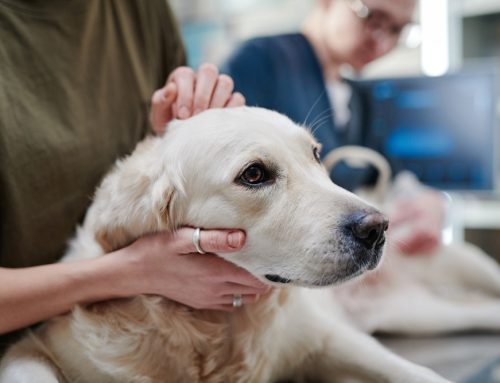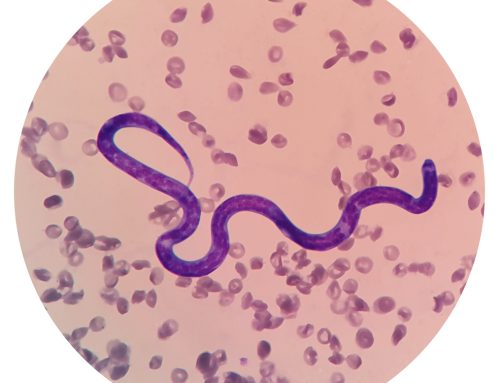Watching your dog vomit can be alarming—they may posture, pace, stretch, and make terrible sounds, after which they may or may not produce a pile of food, bile, or mysterious contents. If your first instinct is to seek veterinary attention, you may be advised to stay home and watch for additional vomiting. Or, you may be the wait-and-see type, but you’re unsure how many vomiting episodes are too many, so you don’t call until your pet is in obvious distress.
Because knowing when to contact Twin Maples Veterinary Hospital for an appointment for your vomiting dog can be difficult, we have assembled a guide to the most common reasons dogs vomit, and when you should get veterinary care.
Is vomiting normal for dogs?
Occasional vomiting can be normal for some dogs, and is often caused by mild gastrointestinal upset, excessive bile or acid buildup, or other benign and transient (i.e., temporary) conditions. As long as your dog does not continue to vomit, or show any additional illness signs, they will probably improve on their own.
If your dog vomits again within 24 hours, you should call Twin Maples Veterinary Hospital to schedule an appointment, to look for an underlying cause.
Vomiting versus regurgitation
During your dog’s physical examination, you’ll be asked to describe your pet’s vomiting. While this may seem unnecessary, vomiting and regurgitation are two different processes that are often confused, but which require different diagnostics and treatment.
While vomiting is an active process involving conscious effort and forceful expulsion of contents from the stomach and small intestine, regurgitation is a passive action without any dramatic warning signs. Regurgitation may occur soon after a meal, if your dog eats too quickly, or is overexcited. Frequent regurgitation may be because of an esophageal disorder known as megaesophagus.
When to seek veterinary care for your vomiting dog
If your dog has vomited, make note of the time, and monitor them closely for the next 24 to 48 hours. Acute or sudden-onset vomiting can cause dogs to deteriorate rapidly, while an increase in chronic vomiting (e.g., from once weekly to once daily) may indicate progression of an underlying condition. Call Twin Maples Veterinary Hospital for an appointment, if your dog meets one or more of the following criteria:
- Your dog’s vomiting is persistent — Repeated vomiting can lead to dehydration, electrolyte imbalance, and weakness, because of loss of body fluids and nutrition. Vomit may initially include partially digested food, but progress to yellow or green foamy bile after the stomach is empty. Common causes for acute vomiting include:
- Dietary indiscretion
- Acute stomach inflammation
- Sudden diet change
- Intestinal parasites
- Liver or kidney disease
- Your dog’s vomiting is unproductive — If your dog repeatedly attempts to vomit without producing food, bile, or fluid, call us immediately. Non-productive vomiting is a hallmark sign for bloat, or gastric dilatation volvulus (GDV), which occurs when the stomach fills with gas and rotates. The rotated stomach entraps the gas, cuts off circulation, and may twist the spleen. Emergency surgery is necessary to save a dog with GDV.
- Your dog is vomiting blood — A dog who is vomiting bright red blood definitely gets everyone’s attention, and rightly so—frank (i.e., obvious) blood is typically from the oral cavity or upper gastrointestinal tract, and may be caused by dental disease, oral injury, bleeding stomach ulcers, or cancer. Digested blood that originates in the small intestine resembles coffee grounds, and can be more challenging to identify. Brown or black flecks in your pet’s vomit can suggest ulceration, cancer, or an intestinal obstruction.
- Your dog is showing other illness signs — Concurrent medical issues suggest a larger problem, and require a thorough veterinary assessment. Concerning signs may include one or more of the following:
- Diarrhea
- Lethargy
- Weakness
- Inappetence
- Pale, yellow, or grey gums
- Fever
- Seizures
- Your dog is a senior or a puppy — Young and old dogs have weaker immune systems, making them vulnerable to bacterial and viral pathogens, and slower to recover from typically mild conditions. Puppies and senior dogs also are more likely to become dehydrated, which can rapidly compromise kidney function. Parvovirus and distemper virus are potential causes for vomiting in unvaccinated or incompletely vaccinated puppies.
- You know or suspect your dog swallowed a toy or inedible item — Curious, indiscriminate dogs may consume toys, small objects, clothing, and food remnants, such as packaging, bones, or corn-on-the-cob. Objects that are too large can lodge anywhere along the upper or lower gastrointestinal tract. Obstruction is diagnosed by X-ray or ultrasound imaging, and requires endoscopic or surgical removal.
- You know or suspect your dog has ingested a toxin — Pets cannot resist many toxic substances, including rodent bait, antifreeze, human medications, certain foods, and poisonous plants. These substances cause acute vomiting and, if untreated, may quickly lead to organ damage and death.
Diagnosing the vomiting dog

Diagnosis includes a thorough history of your dog’s recent behavior, potential exposures, and clinical signs, as well as a comprehensive physical examination to assess for obvious causes, lymph node enlargement, abdominal discomfort, fever, and hydration status. X-ray or ultrasound imaging are used to evaluate abdominal structures, measure tissue thickness, and identify tumors or foreign objects.
Treatment for the vomiting dog varies greatly, depending on their diagnosis and physical condition. If you are uncertain whether you should bring in your vomiting dog for an appointment, do not hesitate to call Twin Maples Veterinary Hospital for guidance. Our team can triage your vomiting dog over the phone, and advise you on the appropriate action.









Leave A Comment